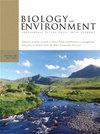Screening anti-tumor constituents from Potamogeton crispus for potential utilisation of constructed wetland plant resources
IF 0.6
4区 环境科学与生态学
Q4 ENVIRONMENTAL SCIENCES
Biology and Environment-Proceedings of the Royal Irish Academy
Pub Date : 2022-01-01
DOI:10.3318/BIOE.2014.19
引用次数: 3
Abstract
Abstract:ABSTRACTPotamogeton crispus L. is a cosmopolitan aquatic macrophyte that has been deployed in constructed wetland as engineering species for ecological and purification functions. However, the extraordinary rapid vegetative growth of P. crispus requires that the species be harvested at the appropriate time to ensure the effectiveness of pollutant removal and minimise the risk of secondary pollution. The efficiency utilisation of wetland plant resources with a large amount of biomass is important in encouraging the harvest and sustainable self-support management of constructed wetlands. To screen the metabolites of P. crispus for tumor cell cytotoxicity, the total secondary metabolites of P. crispus were extracted and separated into three parts by using petroleum ether, ethyl acetate (EtOAc), and n-butyl alcohol. Thereafter, the cytotoxicity assay was conducted by using ES-2 human ovarian cancer and MDA-MB-231 human breast cancer cell lines. Results indicated that the P. crispus EtOAc extract showed anti-tumor activities against MDA-MB-231 cells. Morphological observation, cell cycle, and death analysis were conducted to evaluate the cytotoxic activity. Results showed that the P. crispus EtOAc extract could change the cell morphology and block the MDA-MB-231 cell cycle at the S phase and that the mechanisms of cell death were apoptosis and necrosis. This study provides a scientific basis for the potential utilisation of the constructed wetland plant P. crispus and has implications for the management of sustainable constructed wetland operation.人造湿地植物资源拮抗活性成分筛选研究
摘要:马铃薯(potamogeton crispus L.)是一种世界性的水生大型植物,作为具有生态和净化功能的工程物种被部署在人工湿地中。然而,crispus异常快速的营养生长要求在适当的时间收获该物种,以确保去除污染物的有效性并将二次污染的风险降至最低。高效利用具有大量生物量的湿地植物资源,对促进人工湿地的收获和可持续的自我支持管理具有重要意义。为了筛选crispus的代谢物对肿瘤细胞的毒性,我们提取了crispus的总次生代谢物,用石油醚、乙酸乙酯(EtOAc)和正丁醇进行分离。然后用ES-2人卵巢癌细胞株和MDA-MB-231人乳腺癌细胞株进行细胞毒性试验。结果表明,荆芥EtOAc提取物对MDA-MB-231细胞具有抗肿瘤活性。通过形态学观察、细胞周期和死亡分析来评价细胞毒活性。结果表明,山参EtOAc提取物能改变MDA-MB-231细胞形态,阻断其S期细胞周期,细胞死亡机制为凋亡和坏死。本研究为人工湿地植物crispus的潜在利用提供了科学依据,并对人工湿地可持续运行的管理具有指导意义。
本文章由计算机程序翻译,如有差异,请以英文原文为准。
求助全文
约1分钟内获得全文
求助全文
来源期刊
CiteScore
1.10
自引率
0.00%
发文量
6
审稿时长
>36 weeks
期刊介绍:
The journal aims to offer a broad coverage of the subject area, including the following:
- biology and ecology of the Irish flora and fauna
- microbial ecology
- animal, plant and environmental physiology
- global change
- palaeoecology and palaeoclimatology
- population biology; conservation of genetic resources
- pollution and environmental quality; ecotoxicology
- environmental management
- hydrology
- land use, agriculture, soils and environment.
Submissions on other relevant topics are also welcome, and papers of a cross-disciplinary nature are particularly encouraged.

 求助内容:
求助内容: 应助结果提醒方式:
应助结果提醒方式:


